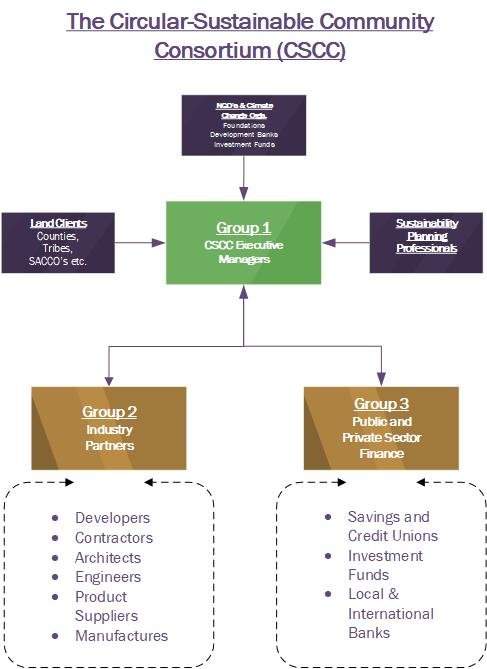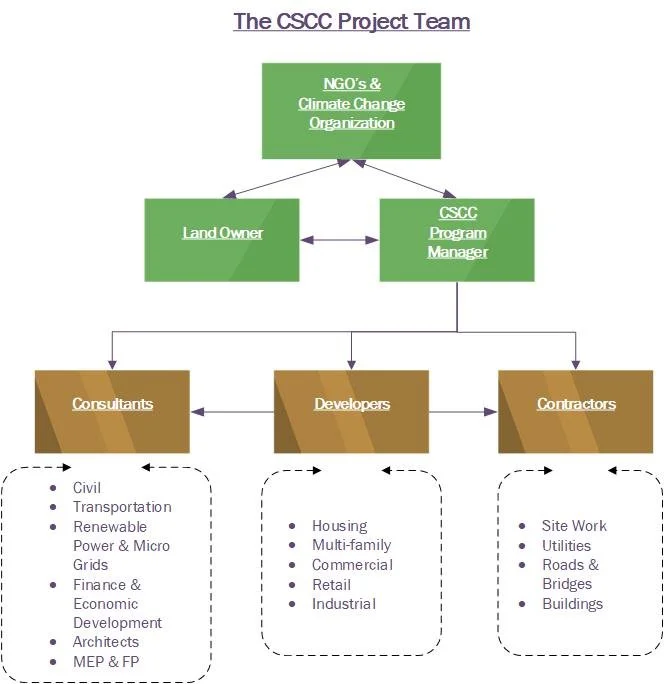
The Circular-Sustainable Community Consortium (CSCC)
Creating a Circular-Sustainable Community (CSC) requires the combined expertise of federal, state and county agencies, city planners, architects and engineers, contractors, investors and climate change and construction finance. Thus, the need for a consortium / industry focused on educating, evolving, promoting and delivering zero carbon and zero waste CSCs. If you have not yet read our CSC White Paper, please do. You will agree that now is the time to introduce a new circular-economy based community model that completely bypasses all of the wasteful practices of the developed world linear economy. By doing this we can save the world by assisting the economically challenged and developing world to become environmental champions and climate change heroes.
CSCC Executive Summary
The CSC consortium will be comprised of three distinct group of stakeholders. Group 1, CSC Executive Managers will consist of the design professionals, land clients, NGO’s and climate change organizations whose main purpose is to maintain, contextualize and execute the CSC guiding principles for the sole purpose of creating circular-sustainable communities. Group 1 will be comprised of 3 distinct sub-groups or committees dedicated to providing consortium leadership, oversight, technical standards and guiding principles and project execution.
A brief outline of each committee responsibility and the associated structure follows:
1. Executive committee: The executive committee (EC) is comprised of a board of directors (15 total) that are elected by the Group 1 consortium members and serve a 2-year term. Each Group 1 consortium company and its subsidiaries are allowed to be represented by one member.
The EC is responsible for overall administration and oversight of the CSC consortium. The EC appoints the steering committee and professional services chairman and is responsible for final approval of pre-qualified CSC service professionals (individuals and firms) and for professional services award of new CSC community development projects.
The CSC bylaws provide details regarding the structure and purpose of each Group and the Group 1 committees.
2. Guiding Principles Committee: The CSC steering committee (SC) is responsible to maintain, update and amend the CSC guiding principles. The SC is also responsible for quality assurance and monitors active projects to ensure that the CSC service professionals are properly managing a CSC community development and properly executing the guiding principles. This QA process will be used as a primary tool to improve and update the guiding principles along with input from the Group 2 and 3 stakeholders
3. CSC Professional Services: The consortium will approve and suspend CSC service professionals. New applicants will be reviewed on a bi-annual basis and pre-qualified by the professional service committee. For new CSC community development projects, the CSC professional services committee will conduct a value source selection process to award the project to the most qualified firm and individuals. A formal RFQ process will be sent out to pre-qualified service professionals. Requirements for an award will be a team consisting of two or more pre-qualified firms and individuals, local expertise and number of prior awards. The CSC professional selection process will attempt to equalize the project awards so as to incentivize firms to become pre-qualified and to become adept at delivering CSC professional services.
This group will ‘Partner for Goals’ by engaging industry subject matter experts (SME’s), private sector financing, developers and construction professionals to participate as CSC stakeholders in one of the three groups. The following diagram depicts the CSC consortium structure:
Professional service companies, climate change organizations, NGO’s and individuals of land-owning entities will not be permitted to participate in any activity that would create a conflict of interest including; land ownership, development of individual building projects, conventional civil, transportation, structural, environmental, architectural and engineering services. Allowable professional services would include; Land owner’s representative, (where the land owner is the principal entity that owns the major stake of the land that will be set-aside for a CSC community – examples; counties, states, countries, SACCO’s, tribes, etc.), master planner, program managers, sustainability training and educating community leaders on the value of CSC guiding principles, contracting officer’s technical representative, sustainability consultant, and CSC industry liaison.
The second group of CSC stakeholders, Group 2 will consist of Industry Partners who are committed to deliver (develop, design and construct) the CSC guiding principles and community development master plan that has been customized and contextualized by the CSC Program Managers and Sustainability Professionals. These stakeholders believe and support the CSC development concept and are participating as a consortium member to show support and create critical mass so as to attract the Group 3 stakeholders, Public and Private Sector Financing.
The public and private sector financing that is provided under Group 3 can be provided by a number of traditional and non-traditional financers. In many aspects the financing will follow traditional private sector financing practices as many of the projects will be the typical types of commercial, industrial and retail building projects that are common with small cities and towns that located in areas of high growth. The exception would be how they are designed and executed to comply with the CSC sustainability guiding principles. A major focus for Group 3 will be to financially support local lending institutions to create low interest rate, long term loans for low-income, affordable homes. Group 1 NGO’s and climate change organizations can have a major influence in creating low interest, long term credit for the housing, commercial and industrial sectors. Given the tremendous climate change and sustainability impact of a CSC community, a major focus of Group 1 climate change organizations will be to underwrite lending for CSC community homes and businesses. Supporting a CSC community will provide normal returns on investment while achieving exceptional climate change impact with minimal risk.
Low interest, long term financing provided by Group 3 will represent the fuel that will ignite the CSC concept into new development model that drastically changes the way communities are developed and climate change is addressed.
Consortium members from Group 2 and 3 can have one non-voting representative be engaged in all meetings (CSC executive committee, steering committee and CSC professional services). The purpose is to allow stakeholder representation and input on all CSC activities so as to allow Group 2 and 3 stakeholders serve in an advisory capacity, thus providing fresh and new ideas, and aiding the CSC community development model to evolve and continue to improve and adopt new technologies as they are able to be cost effectively implemented.
CREATING A NEW CSC
CSC developments will be initiated by the land client setting aside a track of land that they desire to develop into a CSC community. The land client will be required to set aside a portion (percentage) of the land for affordable housing. Adjacent land that is privately owned can be included in the CSC community development plan as long as the land owners are willing to commit to the CSC guiding principles in their entirety. A CSC community must be able to large enough to support the community holistically which entails the creation of jobs through local businesses, and providing incentives to industries to be part of a new and revolutionary community. The CSC planning team goal must be to take advantage of the indigenous natural resources and environment in a responsible manner to generate new business through property tax abatements and other innovative development financing measures.
The CSC Professional Services Firm(s) will serve as the land owners agent / program manager to contract planning, design, development and construction companies that are fully committed to deliver the CSC development project plan. Climate Change Organizations may elect to partner with a local land owner if the proposed CSC development satisfies the strategic interests of the organization and does not involve the acquisition or interest in the land holdings.
There may be circumstances that dictate that it is in the best interest of the CSC development to enter into a master development agreement with one or more developers. These circumstances could include; financing, adjacent land ownership, desire and commitment to help create a CSC community because of what it can do to change our world.


